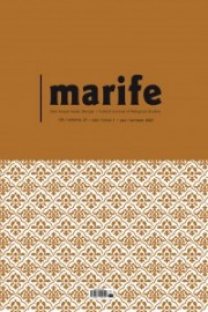TECRÎD-İ SARÎH’İN İLK ÜÇ CİLDİ BAĞLAMINDA AHMED NAÎM’İN ÇEVİRİ METODU, ŞERHÇİLİĞİ, KAYNAK KULLANIMI VE BAZI GÖRÜŞLERİ
Makalenin bu ilk bölümünde Tecrîd-i Sarîh’in müellifi Zebîdi, eseri, Tecrîd’in tercümesi ve Ahmed Naîm hakkında kısa tanıtıcı bilgiler verilecek, daha sonra Ahmed Naîm’in Sahîh-i Buhârî hakkındaki tanıtıcı sözleri, Tecrîd’i çeviriye başlamadan önce müstakil bir eser hüviyetinde Mukaddime yazmasının amacı ve geçmiş âlimlerin değerlendirmelerine yaklaşımı ele alınacaktır.
Anahtar Kelimeler:
TECRÎD-İ, SARÎH’İN, AHMED NAÎM
AHMED NAIM’S METHOD OF TRANSLATION WITHIN THE CONTEXT OF THE FIRST THREE VOLUMES OF TACREED-I SAREEH, HIS SKILL IN EXPLANATION OF THE TEXTS, HIS METHOD IN USING SOURCES AND HIS SOME OF OPINIONS
In this article the importance of translation as a means of dialogue has been explained. The translation is not only to translate a text from any language to another one by means of grammar rules. It is also necessary to know the language with its source very well to be able to make a good translation and it is also a comprehensive action. After the required information was given about Ahmed Naim’s personality and his works in short, the method of Tacreed was explained and then his aim at writting the Mukaddime of Tacreed and his evaluations of the past scholars were focused on. After some information was given about the sorts of text and translation methods such as “form equivalance” and “meaning equivalance”, the most appropriate method which can be used in the translation of hadith texts has been tried to be determined and some problems faced in translations and the problem of method were concentrated on, and then the importance of approaching to the text as a whole was mentioned. The style and succes of Ahmed Naim in using the language was evaluated and it was mentioned that he was not only content to make a simple translation but also he narrated many exlanations and juristical opinions. Sometimes he made some preferences and criticisms. In the section of conclusion, a general evaluations was made and some proposals were offered.
Keywords:
AHMED NAIM, TRANSLATION, CONTEXT,
- Yayın Aralığı: Yılda 2 Sayı
- Başlangıç: 31.05.2001
- Yayıncı: Yediveren Kitap
Sayıdaki Diğer Makaleler
HAKÎM TİRMİZÎ VE ONA AİT BİR MECMÛ‘A
TÜRKİYE’DE İSLÂMÎ TOPLUMSAL DURUM VE CİNSELLİK
Kur’an’da Bilgi, Kavramsal Çerçeve-Bilgi Türleri
“KUR’AN-I KERİM VE TÜRKÇESİ” ADLI ÇEVİRİYE DAİR BAZI DEĞERLENDİRMELER
Uluslararası Bektaşîlik ve Alevîlik Sempozyumu -I- 28-30 Eylül-2005 ISPARTA
BANKA MEVDUAT HESAPLARININ İSLÂM HUKUKU AÇISINDAN DEĞERLENDİRİLMESİ
DİN, SANAT VE TARİHÎ MATERYALİZM
BİLGİSAYAR ORTAMINDAKİ İSLÂMÎ İLİMLER KONULU ARAPÇA PROGRAM VE CD’LER ÜZERİNE
İSLAM VE HIRİSTİYAN DÜŞÜNCESİNDE ÂLEMİN EZELİLİĞİ TARTIŞMALARI ÜZERİNE
